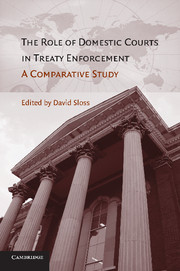Book contents
- Frontmatter
- Contents
- Contributors
- Preface
- Acknowledgments
- 1 Treaty Enforcement in Domestic Courts: A Comparative Analysis
- 2 Does International Law Obligate States to Open Their National Courts to Persons for the Invocation of Treaty Norms That Protect or Benefit Persons?
- 3 Australia
- 4 Canada
- 5 Germany
- 6 India
- 7 Israel
- 8 The Netherlands
- 9 Poland
- 10 Russian Federation
- 11 South Africa
- 12 United Kingdom
- 13 United States
- 14 The Role of Domestic Courts in Treaty Enforcement: Summary and Conclusions
- Index
- References
11 - South Africa
Published online by Cambridge University Press: 06 January 2010
- Frontmatter
- Contents
- Contributors
- Preface
- Acknowledgments
- 1 Treaty Enforcement in Domestic Courts: A Comparative Analysis
- 2 Does International Law Obligate States to Open Their National Courts to Persons for the Invocation of Treaty Norms That Protect or Benefit Persons?
- 3 Australia
- 4 Canada
- 5 Germany
- 6 India
- 7 Israel
- 8 The Netherlands
- 9 Poland
- 10 Russian Federation
- 11 South Africa
- 12 United Kingdom
- 13 United States
- 14 The Role of Domestic Courts in Treaty Enforcement: Summary and Conclusions
- Index
- References
Summary
INTRODUCTION
Any study of the role of domestic courts in the enforcement of treaties in a particular state is built on the assumption that the state in question is an active member of the international community, with courts aware of the state's international treaty obligations. Such an assumption is certainly true of present-day South Africa, but it was not always so. From 1948 to 1994, while the country pursued the policy of apartheid, South Africa was an isolated pariah state with few treaties and courts largely unconcerned about the country's international obligations. Although South Africa was a party to the Charter of the United Nations – which was not incorporated into domestic law – it refused to become a party to many multilateral treaties, particularly in the fields of African organization, human rights, and humanitarian law. Bilateral treaties were entered into, but even here difficulties were encountered. For instance, most states outside of southern Africa declined to enter into extradition agreements with South Africa or terminated existing agreements. Both the all-white executive and all-white legislature were positively hostile to the international community as it sought to persuade, and later compel, South Africa to abandon apartheid. The courts were likewise unsympathetic to arguments premised on customary international law or treaty obligations. For instance, the South African Appellate Division refused to be guided by the human rights clauses in the UN Charter in its interpretation of the reasonableness of racial discrimination.
- Type
- Chapter
- Information
- The Role of Domestic Courts in Treaty EnforcementA Comparative Study, pp. 448 - 475Publisher: Cambridge University PressPrint publication year: 2009

